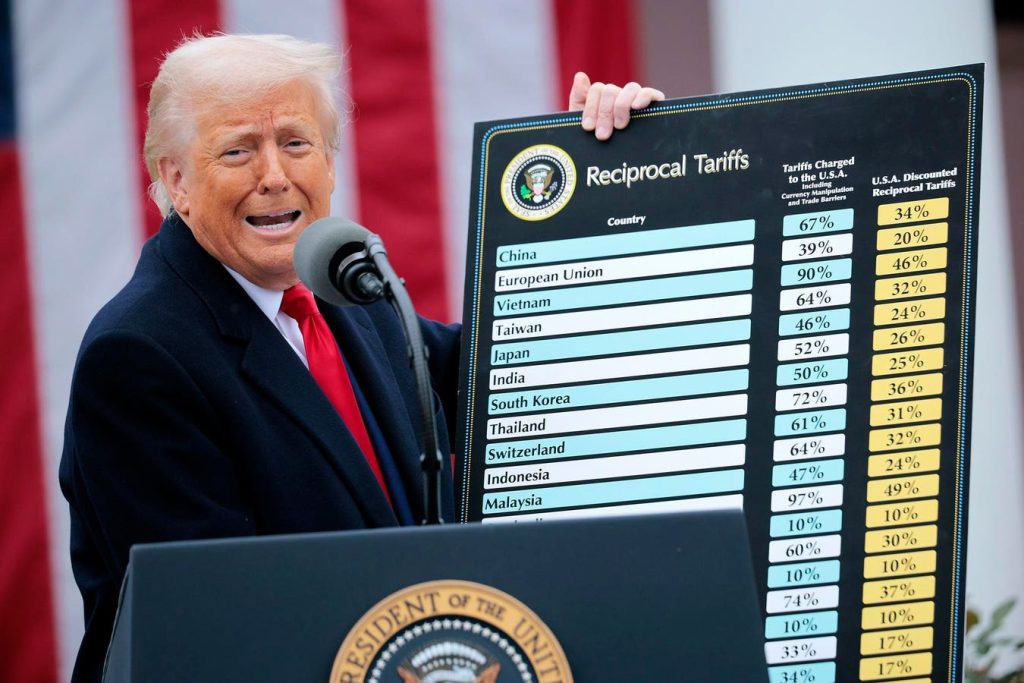WASHINGTON, DC – U.S. President Donald Trump Reveals Reciprocal Tariffs (Photo by Chip … More
Getty Images
On April 3, 2025, Wall Street experienced its largest drop since the COVID pandemic nearly five years earlier.
In response to President Trump’s announcement marking “Liberation Day,” which included a major package of new tariffs, the market reacted swiftly negatively.
The S&P 500 plummeted 4.8%, the Dow Jones Industrial Average declined by 4%, and the Nasdaq dropped 6%. This development raised fears of a prolonged trade dispute, escalating worries regarding inflation and the potential for a recession.
Even gold, traditionally seen as a safe asset, fell significantly after this announcement. Small-cap stocks were hit hardest, with the Russell 2000 dropping 6.6%.
Amid this dramatic market downturn, one asset demonstrated relative stability: Bitcoin. Although the leading cryptocurrency initially decreased by 5%, it quickly recovered, maintaining a price around $81K and rising to over $83K the next day.
Growing Doubts About the U.S. Dollar
A significant reason for Bitcoin’s strength is the increasing concern regarding the long-term stability of the U.S. dollar. Larry Fink, CEO of BlackRock, recently highlighted in his “2025 Annual Chairman’s Letter to Investors” that America’s escalating debt might jeopardize its status as the world’s primary reserve currency.
Fink pointed out that U.S. national debt is growing three times faster than GDP and projected that interest payments on this debt will surpass $952 billion this year, exceeding the defense budget. He warned that by 2030, mandatory federal spending and debt servicing is expected to consume all government revenue, stating, “If the U.S. doesn’t control its debt… America risks losing that position to digital assets like Bitcoin.”
Investor Confidence Rises as Bitcoin Displays Resilience
Despite a significant decline in equity markets, Bitcoin managed to stay above crucial support levels, suggesting lasting investor confidence. This behavior is notably at odds with the widespread selloff affecting small-cap and technology stocks.
While shares of companies tied to the crypto market like Coinbase and MicroStrategy dropped by 7% and 10%, respectively, Bitcoin itself did not suffer as greatly. Tuur Demeester, an investor and economist in Bitcoin, remarked on X that, “As the global economy begins to correct decades of resource misallocation, savers are increasingly drawn to liquid, scarce safe haven assets. Stocks _will_ decouple from Bitcoin.”
Optimism for Bitcoin’s Future
With over 93% of Bitcoin’s total supply already mined and the remaining coins being released at a slower pace due to programmed halvings every four years, Bitcoin is becoming an increasingly rare asset. The fixed cap of 21 million coins—unlike inflation-prone fiat currencies—positions Bitcoin as a strong hedge against currency devaluation and an attractive long-term store of value.
Financial advisor Morgen Rochard noted, “Bitcoin isn’t just a stock choice; it’s an opt-out option.”
A Reliable Alternative in Turbulent Markets
As markets struggle with geopolitical upheavals and economic uncertainty, Bitcoin is proving itself as more than merely a speculative asset. It is emerging as a credible financial alternative. With its fixed supply, increasing adoption, and resilience amidst chaos, Bitcoin provides investors an avenue to sidestep the volatility of traditional monetary systems. In an era of declining trust in conventional assets, owning Bitcoin may transition from seeking profits to ensuring financial autonomy.



